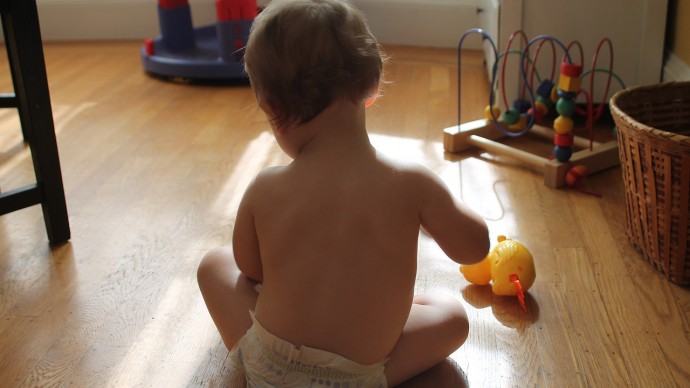When to be concerned with your child’s development
Hey Mommies! Are you concerned with your child’s development? Have you gone through the monthly milestones and seen that your child isn’t meeting some? Have you then gotten worried that your child is delayed because they aren’t meeting every monthly milestone?

Hayley and Heath Williams. Just Kids Early Edication House
By Emily Bettis MOT/L, The Baby Spot November 18, 2015
As parents, we’re always concerned with our child’s development. Even though I work in child development and knew I really shouldn’t be concerned, I still had some mild concerns with my son when he was a baby.
I was worried about my son’s speech and language development. Around 1 year, I would see other babies his age babbling and saying a lot of single words. And there was my son, primarily pointing and grunting like a cave man. I knew I shouldn’t be comparing my son to others, and since I work in child development, I knew it wasn’t time be overly concerned, but I still worried some.
Fortunately, by about 18 months, the language starting flowing, and my son quickly became an incredibly articulate little boy. He just needed a little extra time.
Many parents have trouble knowing when it’s time to be truly concerned with development. It’s good to always be on guard and to monitor your baby’s development, but milestones are guides. If your child does not meet every single monthly milestone, it’s okay. Some will gain certain skills early and other skills later.
However, there is a time when a child’s development truly is a concern, and they may need outside developmental assistance to catch up. Here are some examples of when you should truly be concerned about your child’s development and consider seeking outside assistance.
- Your child is 6-7 months and not rolling over at all in either direction or attempting to roll.
- Your child is 6-7 months and is struggling to hold their head up and prop on their elbows while on their tummy.
- Your child is 9-10 months and is unable to sit on their own without support.
- Your child is 12 months and is unable to crawl.
- Your child is 12 months and is not eating any solid/chewable foods (because they refuse or get upset; not because they haven’t been exposed)
- Your child is 12 months and struggles to or cannot feed themselves with their hands
- Your child is 12 months and is unable to pick up objects with their thumb and index finger (they use their entire hand in a racking motion to pick up objects)
- Your child is 14-16 months and is unable to pull up to stand.
- Your child is 18 months and is unable to walk
- Your child is 18 months and is saying no words and has limited babble. (At this point, you should at least be hearing words like “mama, dada, hi, bye bye, baba, nigh-nigh (night night), uh oh, no”..etc) If your child has none of these at 18 months, then it’s time to be concerned with speech/language.
- At 18-20 months, your child is unable to follow a simple command or respond to a question. (“Where’s your cup?” “Go get your ball”)
- At 18-24 months, your child is not very social with people they know. They seem like they are in their own world the majority of the time, and make little to no eye contact with you or anyone else.
- Your child is 24 months and still only uses single words to communicate and is quite difficult for even you as a parent to understand.
- Your child is 2 years and has a lot of difficulty going up and down stairs.
- Your child is 2 years and is unable to use a spoon or fork to eat their food. (May not be preferred but they should be capable of using utensils at 24 months)
There are many more examples and situations that can be a cause for concern, but these are just some of the more common examples of when there is a true concern of developmental delay.
Another good thing to remember is that if your child is only meeting developmental milestones of a child about half their age, then there is a true concern with development. Example: A 6 month old baby is only at 3 month old developmental milestones. A 12 month old is only at a 6 month level for some milestones. A 24 month old is only at a 12 month level, and so on.

PxHere photo. CC0 Public Domain
Also, a child does not have to be functioning at half their age across all areas of development for their to be a concern. It can be in just one area. For example, an 18 month old is right on track for physical, social, and fine motor development, but only showing 9 month old speech and language skills. If any of this sounds like what you’re experiencing with your child, I would discuss your concerns with your child’s doctor and/or contact your state’s early intervention program to discuss the possibility of early intervention services. You can check out What You Need to Know About Developmental Delay for more info.
The earlier services can start, the better. Many children catch up and show no signs of delay when early intervention services are provided. If your child seems to just be a month or two behind where they should be on developmental milestones, then you may just need to give them a little extra time to catch on. Just keep an eye on it and make sure they don’t continue to fall behind in any particular area. Hope this helps, mommies!
| Emily Bettis, MOT/L is a pediatric occupational therapist and mother. She has been working with children birth-5 since 2008 and has been a mother since 2013. Emily is the founder and author HeyMommies.com |
| The Baby Spot is a Global Parenting Magazine. After starting as a Canadian Parenting Magazine, The Baby Spot knew that parents needed access to information from experts, celebrities and writers from all over the world! We focus on pregnancy, babies, parenting children of all ages, positive parenting articles, recipes, tips, travel and more! Thank you for visiting The Baby Spot, your global spot for all things parenting! |
Source The Baby Spot, Originally posted on Hey Mommies
Also see
Avoid Comparing Milestones Between Toddlers Parents Canada
How to be the best advocate for your child The Baby Spot
What You Need to Know About Developmental Delay Healthline
Spotting Developmental Delays in Your Child: Ages 3-5 Grow by WebMD
Facts About Developmental Disabilities National Center on Birth Defects and Developmental Disabilities, Centers for Disease Control and Prevention
